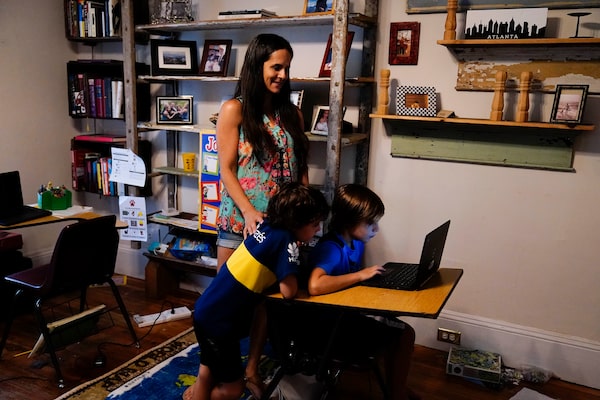
Anna Hamilton, centre, is taking leave from her job at an investment firm so she can guide her children Henry, left, and Adrian, right, through remote schooling, in Decatur, Ga. on Aug. 24, 2020.Brynn Anderson/The Associated Press
Kids are finally heading back to school, but many mothers are still thinking about throwing in the towel at work.
New research by The Prosperity Project (TPP) – a non-profit organization founded to ease the economic strain of the COVID-19 pandemic on Canadian women – paints a disturbing picture of how many working moms considered leaving the work force even as schools prepared to reopen across the country.
A third of employed mothers who were recently surveyed for the study have considered quitting their jobs to help their children with schoolwork. That compares with one-fifth or less of employed fathers.
That so many mothers contemplated dropping out of the work force just as the economy opened up is nothing short of a social failing. If a second wave of COVID-19 infections does materialize this fall, and women start leaving their jobs in droves because of a lack of affordable child care, it would derail Canada’s economic recovery.
“Unless we increase the labour force participation rate of women, we’re not going to be able to grow our economy,” said TPP founder Pamela Jeffery, who is also founder of the Women’s Executive Network and Canadian Board Diversity Council.
Pollara Strategic Insights, TPP’s research partner, conducted an online survey of randomly selected Canadian adults from Aug. 21 to Aug. 24, a period when provincial governments were finalizing their back-to-school plans. The survey’s results are considered accurate to within plus or minus 3.1 percentage points, 19 times out of 20.
Among the survey’s other findings, women were also more likely than men to consider quitting their jobs to be a caregiver for an adult in their family (25 per cent of women versus 18 per cent of men). Roughly an equal number of male and female respondents, meanwhile, said they are likely to ask for reduced hours, change jobs for different working conditions or quit altogether if there is a second wave of COVID-19.
This pandemic has already threatened more than 30 years of women’s labour force gains, according to a separate study by Royal Bank of Canada published in July.
Although women’s employment rebounded in August, there are still gender gaps in the labour force participation rate. "This is an indication that women continue to engage in non-employment-related activities – including caring for children and family members – at a higher rate than prior to COVID-19,” Statistics Canada said last week.
There are plenty of reasons to worry that working mothers will quit their jobs over the coming months. Coronavirus infections are on the rise again, and already some schools are being shuttered. Some employers, meanwhile, are ordering employees back to the office.
Working parents are already at the end of their tether after pulling double duty with their jobs and child care for the past six months. But since the burden of child-rearing still disproportionately falls on women, many working mothers face an impossible choice between protecting their kids or earning an income to pay the bills.
That’s precisely why legislators must make safe and affordable child care a priority in their economic recovery plans. For its part, TPP wants Ottawa to take the lead on creating and funding a national child-care program that charges relatively low fees.
“This lack [of] child care is not a women’s issue," Ms. Jeffery said. "Neither men nor women can be their best professional selves in the absence of access to affordable child care. It’s not just about the mums.”
The best course of action is to model a national plan after Quebec’s subsidized daycare program, Ms. Jeffery said. Provinces should be able to opt in and parents should be provided with flexibility because not everyone works 9 to 5, she added.
TPP is also rightly calling for increased family reunification through immigration to provide yet another affordable child-care option to working parents. It’s a solution that is also being advocated by new Conservative Leader Erin O’Toole.
Extended families are common in other countries and among some newcomers to Canada. Since racialized Canadians, especially women, are still facing higher unemployment rates than their Caucasian peers during this crisis, Ottawa should make it easier for grandparents or other relatives to pitch in with the kids.
Policy-makers cannot afford to turn a blind eye to the plight facing working mothers. Women contribute a growing share of families' earnings (47 per cent in 2015 versus 25 per cent in 1976, according to Statistics Canada), and are often in charge of household finances.
There can be no economic recovery if working mothers call it quits.
Your time is valuable. Have the Top Business Headlines newsletter conveniently delivered to your inbox in the morning or evening. Sign up today.